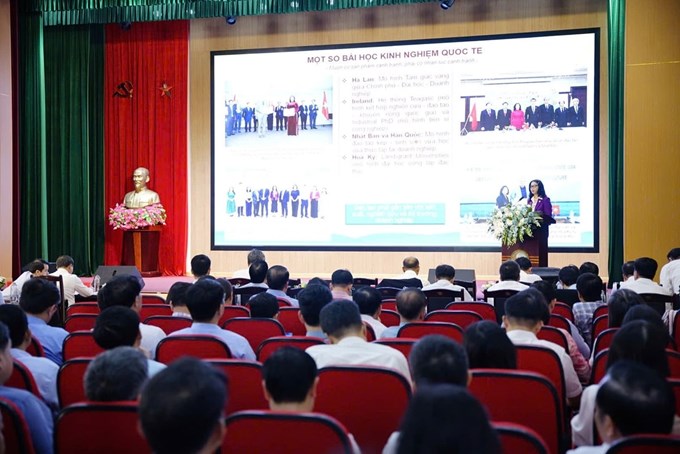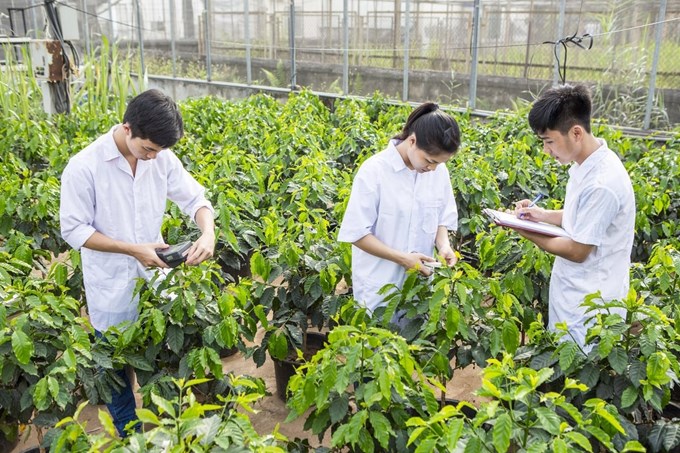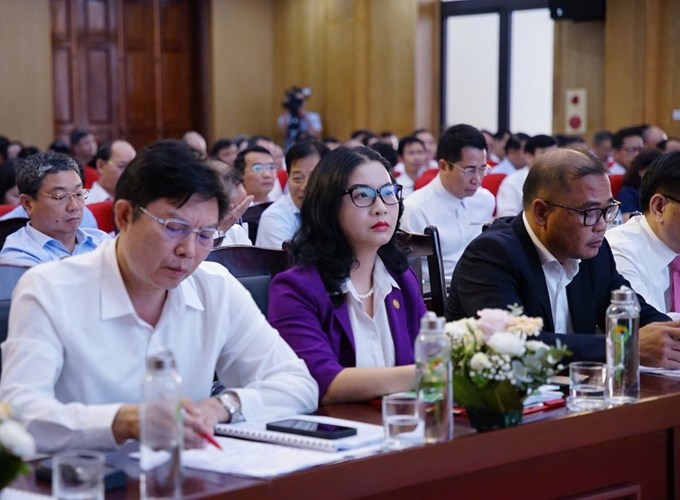Vietnam National University of Agriculture (VNUA) proposed the establishment of a special mechanism and a Human Resource Development Fund, considering them as the strategic solutions to enhance the competitiveness of private enterprises.
Linking training models with research, production, and market needs
On October 3, at the Conference on Human Resource Development for the Agriculture and Environment Sector organized by the Ministry of Agriculture and Environment, Prof. Dr. Nguyen Thi Lan, VNUA’s President, delivered a presentation entitled “Developing High-Quality Human Resources to Serve Private Enterprises in Agriculture.”

Prof. Dr. Nguyễn Thị Lan, VNUA’s President, delivers a presentation entitled “Developing High-Quality Human Resources to Serve Private Enterprises in Agriculture” at the Conference on Human Resource Development in the Agriculture and Environment Sector. Photo by Linh Linh.
Prof. Lan emphasized that VNUA operated based on its core values of “Solidarity – Integrity – Leadership – Responsiveness – Excellence” and its motto “Green Agriculture – Digital Technology – International Integration.” With the guiding principle of “Quality is vitality, and research is the lifeblood”, VNUA continuously innovated to train human resources with knowledge, skills, and resilience to meet integration demands.
Currently, Vietnam had approximately 20,000 agricultural enterprises, over 95% of which were private. These firms were dynamic and pioneering in technology innovation and market expansion. However, they were facing a severe shortage of high-quality human resources, individuals proficient in technical expertise, digital technology, biotechnology, supply chain management, foreign languages, and ESG (Environmental, Social, and Governance) standards. In the era of the Fourth Industrial Revolution, high-quality human resources were the key to enhancing competitiveness and the added value of Vietnamese agricultural products.
According to Prof. Lan, the strategic orientation of the Party and State had clearly emphasized the importance of education, science and technology, and the private sector. Resolution 71-NQ/TW (2025) identified education and training as a breakthrough area; Resolution 68-NQ/TW (2025) affirmed that the private economy was an important driving force; Resolutions 57 and 59 highlighted science, technology, and innovation as central motivators. Therefore, developing high-quality human resources for private agricultural enterprises was not only an educational task but also a political and national strategic requirement.

VNUA recommends that higher education institutions reform their curricula in line with international standards, with a focus on digital skills, foreign languages, and ESG (Environmental, Social, and Governance). The university also suggests promoting dual training programs and Industrial PhD models closely linked to enterprise needs. Photo by QDND.
Drawing from international experience, Prof. Lan highlighted some countries with notable successes, including the Netherlands with its “Golden Triangle” model linking government, universities, and enterprises; Ireland and many European countries implementing Industrial PhD programs, where doctoral candidates both studied and solved practical problems at enterprises; Japan and South Korea with dual education models that combined study and practice; the United States with its Land-grant Universities, which transfered knowledge from classrooms to enterprises and farmers. The common feature among these models was the close connection between education, research, production, and markets.
To implement these strategic directions, VNUA had actively carried out comprehensive reforms. In governance, it streamlined its organizational structure, promoted digital transformation, applied KPI-based management, and established innovation centers and key laboratories. In education, the university integrated digital technologies such as AI, smart classrooms, VR/AR simulations, big data, and blockchain to personalize learning experiences. In research, it prioritized strategic technologies, breakthrough products, intellectual property, and patents, while encouraging spin-off enterprises to commercialize research outcomes and create practical learning environments for students.
Proposal to establish a Human Resource Development Fund
VNUA currently offered 44 undergraduate, 16 master’s, and 16 doctoral programs, many of which met international standards. The university cooperated with nearly 200 domestic and 25 international enterprises. Each year, about 5,000–6,000 students undertook internships at over 300 enterprises, and the employment rate after graduation reached 92–97%, with over 60% working in the private sector. Leading corporations such as ThaiBinh Seed, Dong Giao, PAN, Geleximco, Greenfeed, CP Vietnam, Dabaco, and De Heus Vietnam had participated in curriculum development, scholarship funding, internships, and recruitment.

Prof. Dr. Nguyen Thi Lan, VNUA’s President, affirms that the university will continue to accompany enterprises in building an ecological agriculture, modern rural areas, and civilized farmers, thereby contributing to elevating Vietnamese agriculture to the international level. Photo by Linh Linh.
Notably, VNUA was establishing five spin-off companies in biotechnology, microbial fertilizers, mushroom and algae production, high-tech agriculture, and agricultural e-commerce.
Alongside education, VNUA regarded scientific research as an equally vital pillar. Each year, students undertook 500-700 research projects, engaged in international cooperation activities, and participated in nearly 100 academic, start-up, and skill-based clubs. That was the favourable environment that would help to foster technical competence, digital literacy, soft skills, and foreign language proficiency of the students, preparing graduates to meet the needs of private agricultural enterprises.
In order to develop more strongly, VNUA made the following recommendations: (i) To the National Assembly and the Government, it was of importance to issue a special mechanism for developing high-quality agricultural human resources; establish a Human Resource Development Fund; and improve the legal framework for spin-off enterprises and research commercialization.
(ii) To the ministries and agencies, it was necessary to implement preferential tax, credit, and land policies for enterprises investing in R&D and training cooperation; invest in innovation centers and key laboratories at agricultural universities; (iii) To higher education institutions, it was important to modernize curricula following international standards, focusing on digital skills, foreign languages, and ESG; and to expand dual education and Industrial PhD models aligned with enterprise needs; (iv) To private enterprises, they needed to actively engage in placing training orders, accept interns, increase R&D investment, and collaborate closely with universities.
“Developing high-quality human resources for private agricultural enterprises is not only an immediate task but also a strategic solution to realize the Party’s key resolutions,”
affirmed Prof. Dr. Nguyen Thi Lan, VNUA’s President. With its mission of being “a cradle of knowledge nurturing the excellence of Vietnamese agriculture,” VNUA would continue to accompany enterprises in building an ecological agriculture, modern countryside, and civilized farming community, elevating Vietnamese agriculture to global standards.